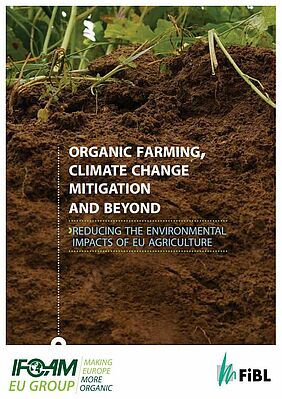This report is the most recent review on the potential of organic agriculture to contribute to climate change mitigation. Furthermore, it reviews the contribution of organic agriculture to other aspects of sustainability, such as biodiversity or – complementary to climate change mitigation – adaptation to climate change.
Besides a general overview on the performance and the potential of organic agriculture in relation to these topics, the report in particular addresses the situation in the European Union (EU) and the potential of organic agriculture to contribute to achieving the EU climate change mitigation goals.
Organic agriculture has a big mitigation potential in soil carbon sequestration (building up humus), in reduced nitrogen application levels and the avoidance of mineral nitrogen fertilizers. Currently (2015), about 6 % of agricultural areas in the EU are under organic management. A gradual increase to 50 % by 2030 could reduce (lower nitrogen levels; no mineral fertilizers) or compensate (soil carbon sequestration) emissions by 10 to 15 % of total agricultural emissions of the EU. In 2030, this mitigation potential would reach about 30 %.
It should be emphasized that this mitigation potential decreases after 2030, due to the saturation dynamics in soil carbon sequestration. If the agricultural area under organic production were kept at 50 %, the annual mitigation potential would amount to about 10 to 15 % in 2060. Furthermore, it is important to note that due to lower yields in organic production, such a switch to organic production would require changes in consumption (less animal products, less food waste). Otherwise, replacement of domestic production with imports may rather relocate than reduce or compensate emissions.
Thus, organic agriculture has a good potential to contribute to climate change mitigation. This is, however, only one of many aspects of sustainability in agriculture. Organic agriculture also contributes to many other aspects, such as improved soil quality, biodiversity or reduced eutrophication of ecosystems. In particular, it contributes to the adaptation of agriculture to climate change.
It is important to assess this potential not only in relation to agricultural production, but to address climate change mitigation on the level of the whole food system. Therefore, changes in consumption patterns are essential. Besides reducing emissions in agricultural production, we need to reduce the consumption of animal products and the food wastage levels.
Further information
Contact
Links
- ifoam-eu.org: Report of the IFOAM EU Group
- ifoam-eu.org: Press release of the IFOAM EU Group
- orgprints.org: Müller, Adrian; Bautze, Lin; Meier, Matthias; Gattinger, Andreas; Gall, Eric; Chatzinikolaou, Effimia; Meredith, Stephen; Ukas, Tonći und Ullmann, Laura (2016) Organic Farming, Climate Change Mitigation and Beyond. reducing the environmental impacts of eu agriculture. IFOAM EU and FiBL.




